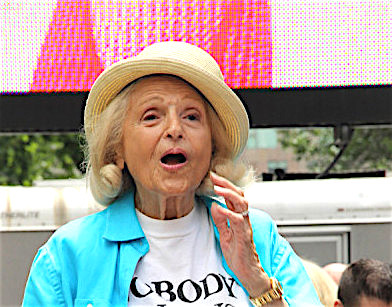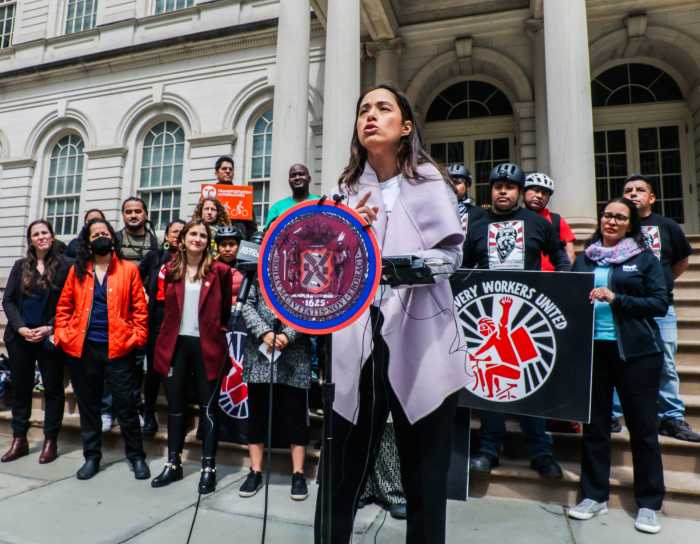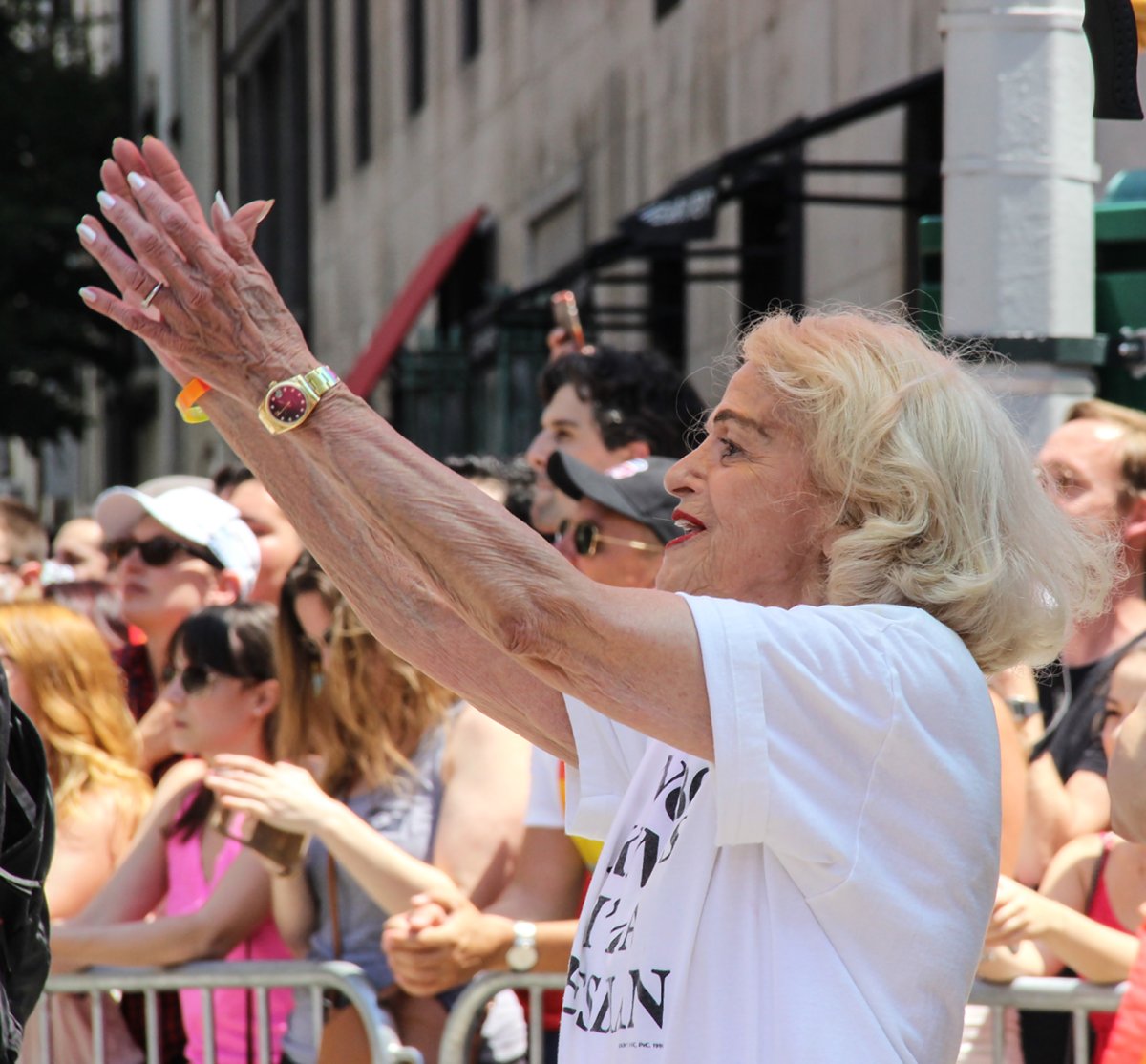
BY PAUL SCHINDLER | Edie Windsor, who became a worldwide icon at age 84 when her lawsuit against the U.S. government led the Supreme Court, in 2013, to strike down the key provision of the Defense of Marriage Act, has died at age 88.
“I lost my beloved spouse, Edie, and the world lost a tiny but tough-as-nails fighter for freedom, justice, and equality,” Judith Kasen-Windsor, who married Windsor last September, said in a written statement. “Edie was the light of my life. She will always be the light for the L.G.B.T.Q. community, which she loved so much and which loved her right back.”
Roberta Kaplan, the civil-rights litigator who represented Windsor in her successful DOMA challenge, said, “Representing Edie Windsor was and will always be the greatest honor of my life. She will go down in the history books as a true American hero. With Edie’s passing, I lost not only a treasured client, but a member of my family. I know that Edie’s memory will always be a blessing to Rachel, myself and Jacob. I also know that her memory will be a blessing not only to every L.G.B.T. person on this planet, but to all who believe in the concept of b’tzelem elohim, or equal dignity for all.”
Windsor’s victory at the Supreme Court, which came on a 5-to-4 vote on June 26, 2013, meant that the federal government was obligated to recognize all legal marriages of same-sex couples on the same terms as those of different-sex couples. Windsor arrived before the Supreme Court in her challenge to a federal estate-tax bill of more than $360,000 after the 2009 death of her first wife, Thea Spyer.
Windsor and Spyer, both New Yorkers who began dating in 1965, had traveled to Toronto in 2007, where they legally married. The following year, a New York court ruled that the state would recognize legal same-sex marriages from other jurisdictions, despite the fact that such marriages could not yet be formalized within the Empire State. Regardless of New York’s recognition of their marriage, the Internal Revenue Service viewed Windsor and Spyer as legal strangers.
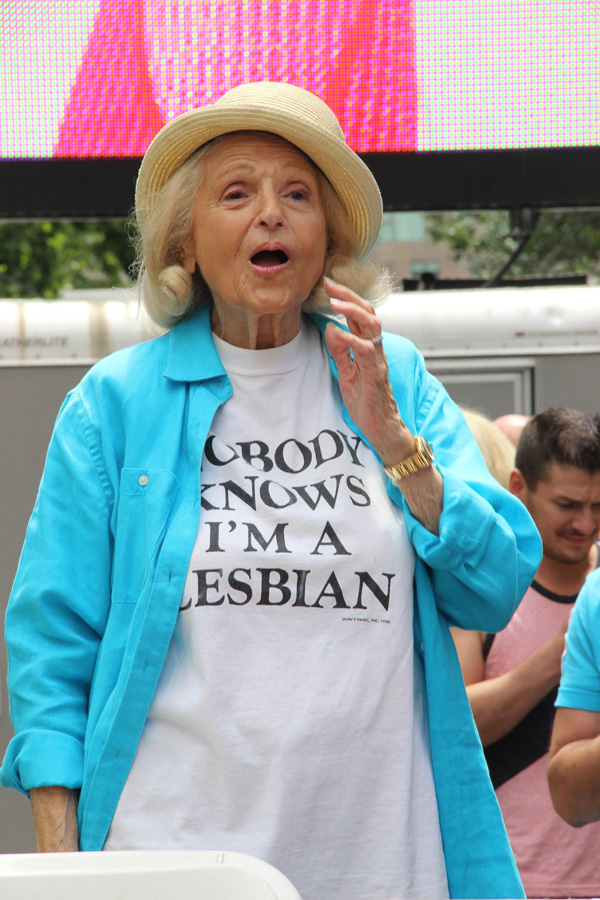
Justice Anthony Kennedy’s majority opinion in the DOMA case made clear that the court was not ruling on the underlying question of whether same-sex couples have a constitutional right to marry — but instead on the narrower issue of whether the federal government must recognize those marriages that are legally recognized by the states or foreign governments.
Over the following two years, district and appeals courts — in a blizzard of pro-equality rulings — drew on the logic of the Windsor decision to find just such a constitutional right. On June 26, 2015, two years to the day after the Windsor ruling, the Supreme Court, in the same 5-to-4 split, ruled that same-sex couples have a right to marry.
Edith Schlain Windsor was born June 20, 1929, in Philadelphia. A graduate of Temple University, she was married to Saul Windsor for a year following college, before divorcing him and moving to New York. Here, she earned a master’s degree in mathematics at New York University and began a career at IBM.
Windsor and Spyer, a psychologist, were in their 30s when they met at a West Village restaurant in 1963 and began a friendship that two years later blossomed into a romance. They got engaged in 1967, but as for marriage, at the time they “never thought it would happen,” Windsor told Gay City News, The Villager’s sister paper, last fall shortly after her marriage to Kasen-Windsor.
Spyer lived with a multiple sclerosis diagnosis for decades before her death, and as Kaplan noted, when the couple traveled to Canada for their wedding, “four best women and two best men” were needed to help assemble and disassemble Spyer’s wheelchair at airports in New York and Toronto.
“That’s how much they wanted to get married,” Kaplan said as the time of the DOMA victory.
The couple traveled to Toronto as part of an effort dubbed the Civil Marriage Trail, founded by New York activists Brendan Fay and Jesús Lebron after the Canadian courts ruled in 2003 that same-sex couples there had the right to marry. Civil Marriage Trail facilitated the planning for U.S. couples wishing to travel to Canada to marry.
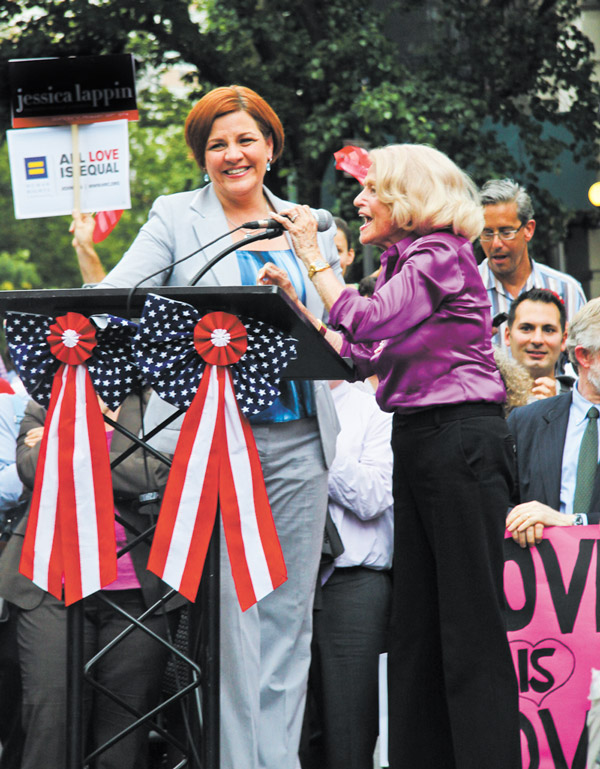
In June 2013, victorious DOMA plaintiff Edie Windsor spoke outside the Stonewall as then-City Council Speaker Christine Quinn beamed proudly.
When Windsor decided to mount a federal case against DOMA, she was no stranger to activism. In addition to years of working alongside the community’s earliest marriage advocates, she was, by 2010, already the recipient of a Lifetime Achievement Award from SAGE (Services and Advocacy for GLBT Elders), and had long been involved as well with the L.G.B.T. Community Center and the Callen-Lorde Community Health Center.
But in 44 years with Spyer, Windsor’s path to outspoken advocacy was a gradual one. On the day she prevailed over DOMA, Windsor told a packed news conference at the L.G.B.T. Community Center, “Internalized homophobia is a bitch.” For many years during her relationship with Spyer, she said, “I lied all the time” to a close-knit group of coworkers at IBM.
Internalized homophobia seemed an odd topic to be broached by a woman whom others at the same press conference called a hero and “shero” and compared to Susan B. Anthony, Rosa Parks and Harvey Milk. Windsor had just gotten off the phone with President Barack Obama, who called her from Air Force One when the Supreme Court ruling came down. (The former president, who said he spoke to Windsor just a few days before her death, said of her this week, “Few were as small in stature as Edie Windsor — and few made as big a difference to America.”)
At the same news conference, when a reporter asked her what love is, Windsor at first said there are many types of loves, then alluded to the excitement of her sexual relationship with Spyer, admitting that her late wife always insisted they “keep it hot.” Barely missing a beat, Windsor then quoted at some length a W.H. Auden poem about romantic love.
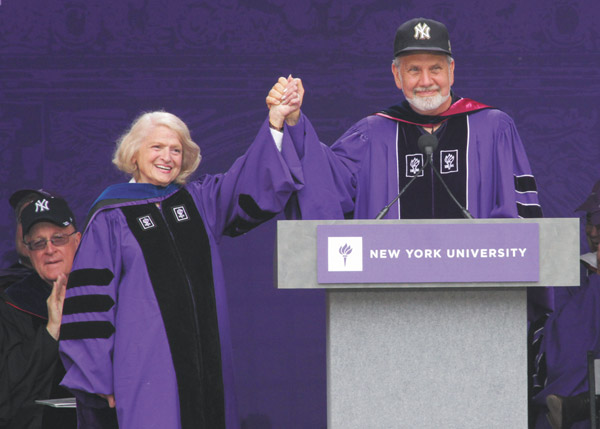
Insisting that the two-and-a-half years of DOMA litigation she endured were “joyous, just joyous,” Windsor said, “If I had to survive Thea, what a glorious way to do it. And she would be so pleased.”
In the wake of her DOMA win — which unleashed a euphoric L.G.B.T.Q. response from coast to coast — Windsor’s vigor in using her newfound fame to advance the community’s agenda was nothing short of astonishing. Whether it was the Center’s annual Women’s Event, a rollout of a national senior housing initiative by SAGE, a rally for homeless L.G.B.T. youth in Union Square or innumerable other gatherings, she seemed to be everywhere.
“Because of my name, because I am Edie Windsor, I have a certain amount of pull,” she said last fall. “And I feel an obligation when somebody asks me to please come speak or even to put my name on their ad — ‘Yes, yes, and I promise I’ll be there.’”
Even as she was constantly in the public eye, Windsor admitted after marrying Kasen-Windsor, she had felt a deep and enduring loss from Spyer’s death. Her life, she told Gay City News, was “very full with the community, but that’s not the same. And when Judith came into my life, I had just admitted to my best friend, ‘You know, I’m really lonely.’”
Windsor’s relationship with Kasen-Windsor began in late 2015, when Judith walked Edie home from an L.G.B.T. Community Center holiday party to Windsor’s lower Fifth Ave. apartment
“We talked for, like, hours,” Kasen-Windsor recalled last fall. “We sat and talked for hours, and then in the hallway, by her door, she kissed me. Then I called her during the week, and she asked me to go to Robbie [Kaplan’s] Hanukkah party that following Friday.”
“And very quickly, very quickly, it really caught quick, it really caught,” Windsor interjected. “We began dating seriously, almost right away.”
After an illness last summer, Windsor decided it was the right time to tie the knot again.
“I said, ‘I think we should do it right away,’ ” Edie recalled telling Judith. “My sense was that if I’m going to die on her, it would be unfair — we were clearly in love, we were practically living together, and that I shouldn’t cheat her” by leaving her unmarried.
With Kasen-Windsor’s best friend, Danielle Reda, visiting from France, the couple traveled to Manhattan’s Marriage Bureau on Worth St. on a late September Monday to pledge their vows. When their officiant, Angel Lopez, learned from Judith who the other bride was, he briefly excused himself, saying, “Let me get my boss,” City Clerk Michael McSweeney.
When asked whether her new marriage meant she was ready to slow down in her activism, Windsor shot back instantaneously, “Not at all!”
This past June 11, she was in Washington as the grand marshal for the Equality March for Unity & Pride, organized in response to the anti-L.G.B.T.Q. backlash brought on by the new Trump administration. Two weekends later, she marched in the Dyke March and the L.G.B.T.Q. Pride March on consecutive days.
In insisting last fall that she would never retire as an activist, Windsor recalled a recent speech she had given, after which “everybody kept thanking me. And I said, ‘Thank you.’ I’m somebody who was really a dumb, ignorant middle-class woman, who said, ‘I’m not in trouble about being gay but I do have trouble identifying with those queens,’ and then a queen overturned that police car and changed my life. O.K., so that was the beginning of my sense of unity.
“And then during the AIDS crisis, when the lesbians poured in to help, what had then been a split really between the males and the females was deeply changed and my sense of community grew.
“And then when people were pouring into, looking to get into the Supreme Court, that made it even wider, that meant that we were out more — and the more of us that got out, the more of us got out. It was suddenly wonderful not to be left behind in the closet. And it keeps happening. But it also happens with the straight world. Mothers discovered that their kids were gay. Everybody discovered that their neighbor was, that their friend was. And a lot of the stigma for us disappeared.”
Then, on that early autumn day last year, even as she voiced dread at the possibility that Donald Trump could win the White House — something that at the time she said might force her and Judith into exile in Spain — Edie Windsor said, “I’m grateful to live in this great world.”
A public memorial will be held this Fri., Sept. 15, at Riverside Memorial Chapel, 180 W. 76th St., at 12:30 p.m. In lieu of flowers, Edie Windsor had requested that any donations in her memory be made to the following organizations: the L.G.B.T. Community Center, the Callen-Lorde Community Health Center, the Hetrick-Martin Institute and SAGE.



